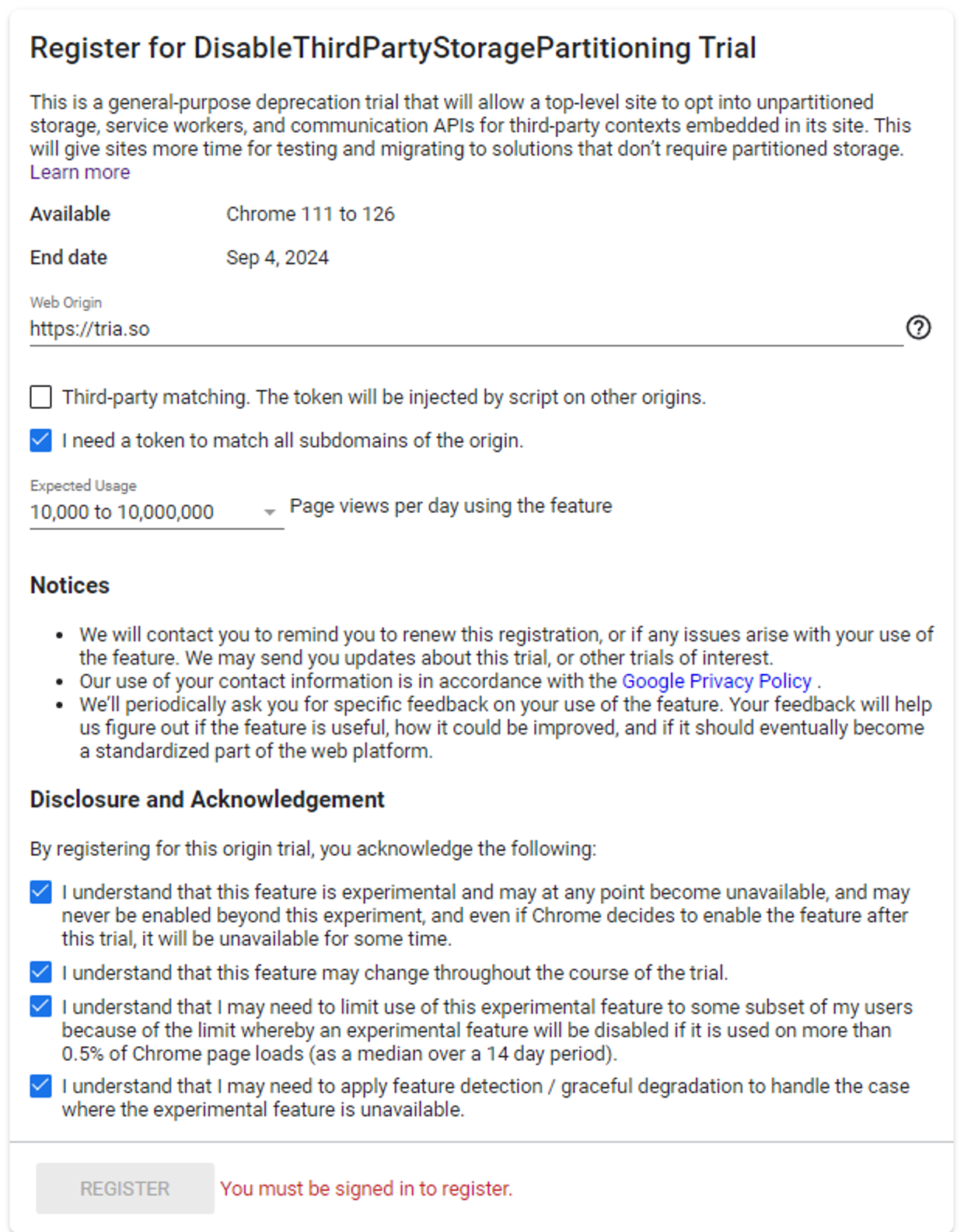React.js
Installing Tria SDK on React.js, on all latest major versions.
1. Create a .npmrc and add the following token:
.npmrc
//registry.npmjs.org/:_authToken=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
registry=https://registry.npmjs.org/
2. Add token to the meta tag in index.html at the root level of your app (Local):
- This token is origin specific
- Below is the one mentioned for http://localhost:3000
Meta tag in index.html
<meta
http-equiv="origin-trial"
content="AlU4GUR1ZBasFEUCNe8USkx7GSokITQbNSdgFlU9Zrg6aP+ThjAbiDdKq0gXIdk/agcphCw4k/hxIBcSD4wilQ8AAABneyJvcmlnaW4iOiJodHRwOi8vbG9jYWxob3N0OjMwMDAiLCJmZWF0dXJlIjoiRGlzYWJsZVRoaXJkUGFydHlTdG9yYWdlUGFydGl0aW9uaW5nIiwiZXhwaXJ5IjoxNzI1NDA3OTk5fQ=="
/>
2.1 Add the token to your web app on a custom domain.
- Head to https://developer.chrome.com/origintrials/#/view_trial/-8517432795264450559
- Register for DisableThirdPartyStoragePartitioning Trial.
- Refer to the image below.

3. Inside App.js:
App.js
import { useTriaConnector } from "@tria-sdk/connect";
const { globalData } = useTriaConnector({ authUrl: "https://auth.tria.so", walletUrl:"https://wallet.tria.so" });
4. Inside your login component:
Login Component
import Application from "@tria-sdk/authenticate"
import "@tria-sdk/authenticate/dist/index.css"
5. In your login component, add this inside return:
Return logic, inside of the login component
<Application
logo="your_logo" //example: "https://fusion_x.logo.svg"
dappName="your_dapp_name" //example: "Fusion X"
dappDomain={window.parent.origin}
primaryColor="your_dapp_primary_color" //example: "#FFFFFF"
defaultChain="your_desired_default_chain" //example: "FUSE"
supportedChains={["chain1", "chain2"]} //example: {["POLYGON", "MUMBAI"]}
uiType="yes" // for external wallets
darkMode = {true} //for enabling dark mode
buttonPosition={x:200, y:200} //for draggable wallet
/>
6. Add craco to your devDependencies using the following npm command:
devDependencies
npm i @craco/craco --save-dev
7. Create a craco.config.js file in the root folder and add the following:
Craco.config.js file in the root folder
module.exports = {
webpack: {
configure: (config) => {
// ...
const fileLoaderRule = getFileLoaderRule(config.module.rules);
if(!fileLoaderRule) {
throw new Error("File loader not found");
}
fileLoaderRule.exclude.push(/\.cjs$/);
// ...
const scopePluginIndex = config.resolve.plugins.findIndex(
({ constructor }) => constructor && constructor.name === 'ModuleScopePlugin'
);
config.resolve.plugins.splice(scopePluginIndex, 1);
config['resolve'] = {
fallback: {
crypto: require.resolve("crypto-browserify"),
stream: require.resolve("stream-browserify"),
assert: require.resolve("assert"),
http: require.resolve("stream-http"),
https: require.resolve("https-browserify"),
os: require.resolve("os-browserify"),
url: require.resolve("url"),
zlib: require.resolve("browserify-zlib"),
},
}
return config;
}
}
};
function getFileLoaderRule(rules) {
for(const rule of rules) {
if("oneOf" in rule) {
const found = getFileLoaderRule(rule.oneOf);
if(found) {
return found;
}
} else if(rule.test === undefined && rule.type === 'asset/resource') {
return rule;
}
}
}
Need support? Join our Discord, or send us an email at [email protected].